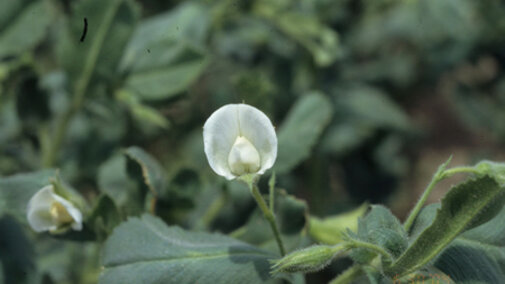From growing chick peas in western Nebraska to reducing pesticide use in apple orchards in Nebraska City, 12 specialty crop projects across the state will receive nearly $600,000 in funding from the U.S. Department of Agriculture’s Specialty Crop Block Grant Program (SCBGP). Administered by the Nebraska Department of Agriculture (NDA) using funding from the grant, the program supports research, development and marketing of specialty crops.
“Nebraska’s Specialty Crop Block Grant Program offers resources to those interested in enhancing and diversifying the state’s agricultural industry through specialty crops,” said NDA Director Greg Ibach. “This year’s projects contribute to Nebraska’s overall agricultural economy by maximizing the value of specialty crops and by keeping production and research in the state.”
Specialty crops are generally defined as fruits, vegetables, nuts, honey and some turf and ornamental crops. (See full list of specialty crops at www.ams.usda.gov/services/grants/scbgp/specialty-crop.)
USDA Grants for University Research on Specialty Crops and Products
Positioning Chickpea to Succeed in Western Nebraska ($50,220)
Lead Investigator: Cody Creech, Nebraska Extension Dryland Cropping Systems Specialist
The University of Nebraska will evaluate the suitability of chickpea production in dryland production systems of western Nebraska by measuring the amount of soil moisture required to produce adequate seed quality and yields. Chickpea cultivars will be grown under different levels of soil moisture and limited irrigation to determine which cultivars are best suited for use in dryland systems. Research will also evaluate the amount of soil moisture required to produce a satisfactory crop. The impact of chickpea production on soil parameters and the following crop yields will be recorded. Results will be shared with stakeholders through grower meetings, field days, publications, and digital forms that include Twitter, YouTube, and CropWatch.
Comparison of the Competitive Ability of Dry Bean and Pea to Control Herbicide-Resistant Pigweed Species ($14,280.88)
Lead Investigator: Nevin Lawrence, Nebraska Extension Integrated Weed Management Specialist
A trial will be established over three years by the University of Nebraska Panhandle Research and Extension Center (PHREC) Weed Science program in Scottsbluff to compare the competitive ability of dry beans and field peas to suppress herbicide‐resistant pigweed species. The trial will be located in an area heavily infested with herbicide‐resistant pigweed. Dry beans will be planted at both 8- and 22-inch row spacing, corresponding to conventional and direct harvest practices. Peas will only be planted in an 8-inch row spacing. Each crop and row spacing will include treatments with and without herbicides. Comparisons of non‐herbicide and herbicide-treated plots will allow the establishment of the competitive ability of each crop and a measure of the value of adding herbicide to the cropping system. Weed abundance, weed biomass, and crop yield will be measured in each plot.
Production and Utilization of High-Quality Protein Isolates from Dry Edible Beans ($39,943.80)
Lead Investigator: Yue Zhang, assistant professor, Department of Food Science and Technology, with Devin Rose, associate professor of Food Science and Technology
The University of Nebraska-Lincoln (UNL) will manufacture high-quality protein isolates from dry edible beans and identify their potential application opportunities as functional ingredients mainly in the food industry. To fulfill this goal, the extraction methods of protein from three dry beans including great northern, pinto, and navy beans will be optimized. The functional properties of these protein isolates will be studied and their potential applications as baking, foaming, and breading ingredients will be determined and introduced to the food industry and academia. The project's long-term goal is to increase utilization of dry edible beans and thereby increase the vitality of local economy in western Nebraska.
Other Nebraska Specialty Grants
- Develop biodegradable mulch film and evaluate its effectiveness on specialty crops such as tomatoes and peppers; University of Nebraska-Lincoln
- Incorporate more locally grown specialty crops into the School Meals Program by developing a user-friendly toolkit for food service staff; Nebraska Department of Education
- Conduct a needs assessment and strategic plan with grape growers, winemakers and winery owners across Nebraska to improve the economic vitality of vineyards and wineries in order to continue producing high quality grapes and wines while promoting stewardship; Nebraska Winery and Grape Growers Association
- Improve the quality, safety and nutritional value of Nebraska-grown aronia berry products by using high pressure processing technology; University of Nebraska-Lincoln
- Investigate the feasibility of using ozone technology to eliminate or reduce pesticide use for disease control in apple orchards which in turn improves food safety; Arbor Day Foundation (Arbor Day Farm)
- Expand the use of drones to the specialty crop industry of viticulture to monitor possible herbicide drift and provide valuable information to grape growers and the wine industry; Nebraska Winery and Grape Growers Association
- Reduce inputs and increase yields of broccoli and peppers by determining optimum application rates of seed meals for integrated management of weeds and nitrogen fertility across four locations in eastern Nebraska; University of Nebraska-Lincoln
- Increase tomato yield and quality while reducing irrigation and synthetic nitrogen fertilizer use through the adoption of water and nutrient use, efficient hybrid tomato rootstocks and carbon-based fertilizer amendments; University of Nebraska-Lincoln.
Projects funded by the SCBGP must be completed by Sept. 29, 2020. For more information about this year’s grants, go to USDA’s website at www.ams.usda.gov/services/grants/scbgp/awards and click on “FY2017 pdf.”

